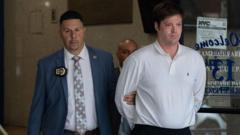The plea deal for Khalid Sheikh Mohammed, the alleged mastermind behind the 9/11 attacks, is stalled once again following objections from the U.S. government. Families of victims express frustration as hope for closure fades amid a legal quagmire, with implications for the future of the controversial Guantanamo Bay detention facility.
The Continual Standoff: Khalid Sheikh Mohammed's Guilty Plea Delayed Yet Again

The Continual Standoff: Khalid Sheikh Mohammed's Guilty Plea Delayed Yet Again
Khalid Sheikh Mohammed's long-awaited guilty plea regarding the 9/11 attacks has been postponed, complicating an already convoluted legal process that spans over two decades.
Article text:
Sitting quietly in a war court room at the U.S. naval base in Guantanamo Bay, Cuba, Khalid Sheikh Mohammed, often dubbed the 9/11 mastermind, seemed engaged as proceedings unfolded around him. "Can you confirm that Mr. Mohammed is pleading guilty to all charges and specifications without exceptions?" asked the presiding judge, to which his attorney nodded affirmatively. Mohammed, now 59 years old and unrecognizable from photos taken shortly after his 2003 capture, had intended to formally plead guilty this week, nearly 23 years after the tragic events that led to the deaths of almost 3,000 individuals in what has been labeled "the most egregious criminal act on American soil."
However, just two days before he was to make his declaration—stemming from a controversial agreement he reached with U.S. prosecutors—the court designedly paused proceedings at the instruction of a federal appeals court. Anticipated as a significant moment in a trial marked by extended delays, the sudden halt added more uncertainty to an already fraught situation. "It’s going to be the forever trial," lamented a family member of a 9/11 victim, encapsulating the sentiment felt by many.
Mohammed has admitted in the past to orchestrating the 9/11 attacks, envisioning the operation including training pilots to use commercial planes as weapons before collaborating with Osama bin Laden. This latest pause was triggered by a legal dispute surrounding the plea deal, negotiated last year, which would spare Mohammed from the death penalty in exchange for admitting guilt. The U.S. government has contested this agreement, claiming it could inflict "irreparable" harm to national interests and the American public. Supporters of the deal argue it is the most viable path forward given the complexities facing the case—especially the ethical issues surrounding the treatment of detainees.
The stoppage follows a last-minute appeal from prosecutors, prompting a federal appeals court to seek additional time to consider their arguments before delivering a ruling on the matter. Families of 9/11 victims had traveled to the base, often at great personal cost, in hopes of witnessing the pleas. For attendees like Elizabeth Miller, whose firefighter father perished in the attacks, the abrupt postponement was a source of frustration. While she supported the plea deal as a means to achieve closure, she appreciated that opinions among families varied sharply, leaving many feeling caught in a cycle of hope and disappointment. "Each time this goes back and forth, it’s like constant whiplash," she expressed.
The delays in Mohammed’s case are emblematic of broader issues at Guantanamo Bay, where detainees have been held for over two decades amidst legal complexities and contentious debates surrounding their treatment. Initially established in response to the 9/11 attacks with military tribunals authorized by then-President George Bush, the facility has been fraught with challenges, culminating in ongoing critiques from rights organizations and calls for its closure. Despite occasional movements toward resolution—like President Obama’s unsuccessful pledge to shut down the facility—operations continue under military commissions that differ significantly from traditional U.S. legal frameworks.
As of now, Guantanamo houses only 15 detainees, a striking reduction from the nearly 800 held at its peak. The remaining detainees, most of whom face charges, continue to navigate a labyrinthine legal landscape rife with obstacles. Mohammed’s case underscores the broader tragedy of the 9/11 aftermath, as families cling to maybes of closure while the trial faces delays, foreshadowing potential complications in the next U.S. administration’s handling of the ongoing saga.
Sitting quietly in a war court room at the U.S. naval base in Guantanamo Bay, Cuba, Khalid Sheikh Mohammed, often dubbed the 9/11 mastermind, seemed engaged as proceedings unfolded around him. "Can you confirm that Mr. Mohammed is pleading guilty to all charges and specifications without exceptions?" asked the presiding judge, to which his attorney nodded affirmatively. Mohammed, now 59 years old and unrecognizable from photos taken shortly after his 2003 capture, had intended to formally plead guilty this week, nearly 23 years after the tragic events that led to the deaths of almost 3,000 individuals in what has been labeled "the most egregious criminal act on American soil."
However, just two days before he was to make his declaration—stemming from a controversial agreement he reached with U.S. prosecutors—the court designedly paused proceedings at the instruction of a federal appeals court. Anticipated as a significant moment in a trial marked by extended delays, the sudden halt added more uncertainty to an already fraught situation. "It’s going to be the forever trial," lamented a family member of a 9/11 victim, encapsulating the sentiment felt by many.
Mohammed has admitted in the past to orchestrating the 9/11 attacks, envisioning the operation including training pilots to use commercial planes as weapons before collaborating with Osama bin Laden. This latest pause was triggered by a legal dispute surrounding the plea deal, negotiated last year, which would spare Mohammed from the death penalty in exchange for admitting guilt. The U.S. government has contested this agreement, claiming it could inflict "irreparable" harm to national interests and the American public. Supporters of the deal argue it is the most viable path forward given the complexities facing the case—especially the ethical issues surrounding the treatment of detainees.
The stoppage follows a last-minute appeal from prosecutors, prompting a federal appeals court to seek additional time to consider their arguments before delivering a ruling on the matter. Families of 9/11 victims had traveled to the base, often at great personal cost, in hopes of witnessing the pleas. For attendees like Elizabeth Miller, whose firefighter father perished in the attacks, the abrupt postponement was a source of frustration. While she supported the plea deal as a means to achieve closure, she appreciated that opinions among families varied sharply, leaving many feeling caught in a cycle of hope and disappointment. "Each time this goes back and forth, it’s like constant whiplash," she expressed.
The delays in Mohammed’s case are emblematic of broader issues at Guantanamo Bay, where detainees have been held for over two decades amidst legal complexities and contentious debates surrounding their treatment. Initially established in response to the 9/11 attacks with military tribunals authorized by then-President George Bush, the facility has been fraught with challenges, culminating in ongoing critiques from rights organizations and calls for its closure. Despite occasional movements toward resolution—like President Obama’s unsuccessful pledge to shut down the facility—operations continue under military commissions that differ significantly from traditional U.S. legal frameworks.
As of now, Guantanamo houses only 15 detainees, a striking reduction from the nearly 800 held at its peak. The remaining detainees, most of whom face charges, continue to navigate a labyrinthine legal landscape rife with obstacles. Mohammed’s case underscores the broader tragedy of the 9/11 aftermath, as families cling to maybes of closure while the trial faces delays, foreshadowing potential complications in the next U.S. administration’s handling of the ongoing saga.





















